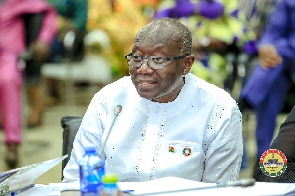Finance Minister, Ken Ofori-Atta, has said he finds it “curious” that the minority caucus cited energy bills saddling Ghana’s coffers to back their claim that he has been reckless in managing the economy when, according to him, a lot of debt burden is a result of needless contracts signed by the Mahama administration with some independent power producers during the dumsor season.
When he appeared before parliament’s ad hoc committee to defend himself against seven allegations being used by the minority caucus as the bases for seeking his removal from office through a censure motion, Mr Ofori-Atta said: “We laid out the 2022 budget to achieve fiscal consolidation anchored on debt sustainability”.
He added that, “It is important at this point, to also highlight that a key component of the national debt stock related to three exceptional expenditure items that are neither external nor a creation of this government”.
He said: “Energy Sector Excess Capacity payments (GHC17 billion), which relate to a legacy of take or pay contracts that saddled the country’s economy with annual excess capacity charges of close to US$1 billion; direct COVID-19 expenditure amounted to GHC 12.0 billion, and the banking sector clean-up (GHC 25 billion)”.
These three items alone, Mr Ofori-Atta noted contribute to about 23% of the country's annual debt servicing cost.
“These three items were not created through the recklessness of the New Patriotic Party”, he noted.
According to him, the “long dumsor that Ghanaians endured under the NDC administration between 2012 and 2016 was more to do with the NDC government’s inability to pay for power”.
“So, Co-Chairs, I find it curious that Hon. Ato Forson will choose to cite energy bills as an example of the recklessness that the Minority charges me with and seek my removal by censure, especially when we have had to pay around $500 million dollars a year in excess capacity charges, for power the previous administration negotiated that we do not need and we do not use”, he explained.
“In actual fact, we have been able to renegotiate some of these power purchase agreements and the new agreements with the Priority IPPs, once finalised and executed will offer estimated nominal savings of more than USD 4 billion over the next 5 years”.
Watch the latest episode of BizTech below:
General News of Wednesday, 23 November 2022
Source: classfmonline.com

















